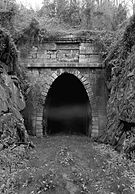The Virginia Central Railroad was an early railroad in the U.S. state of Virginia that operated between 1850 and 1868 from Richmond westward for nearly 200 miles (320 km) to Covington. Chartered in 1836 as the Louisa Railroad by the Virginia General Assembly, the railroad began near the Richmond, Fredericksburg and Potomac Railroad's line and expanded westward, reaching Gordonsville by 1840, and the base of the Blue Ridge in 1852. Renamed the Virginia Central Railroad, the railroad used a temporary track built over Rockfish Gap until the completion of the Blue Ridge Tunnel, connecting it with the Shenandoah Valley.
The railroad faced significant action against it during the American Civil War as a prime target for raids by Union Cavalry Although the war left the railroad with only a fraction of its line left operable, the railroad was running over its entire pre-war length by July 1865. In 1868, the Chesapeake and Ohio Railroad was formed from the merger of the Virginia Central Railroad and the Covington and Ohio Railroad, expanding westward to the Ohio River by 1873. Today, CSX, Amtrak, and the Buckingham Branch Railroad still use portions of the old Virginia Central line for freight and passenger rail service.
